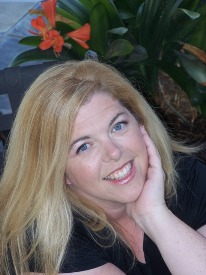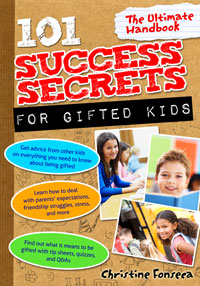I have been watching Christine Fonseca’s writing career progress rapidly over the past few years. She has worked hard with a smile on her face and a kind word for fellow writers along the way. It is my great pleasure to welcome her to the giveaway today. Please say hello…
 Christine Fonseca is the author of Emotional Intensity In Gifted Students (Prufrock Press, Oct. 2010) and 101 Success Secrets For Gifted Kids (Prufrock Press, April, 2011). In addition to writing books related to giftedness, she writes Gothic romance and contemporary novels for teens. If you would like to learn more about Christine, please visit: www.christinefonseca.com.
Christine Fonseca is the author of Emotional Intensity In Gifted Students (Prufrock Press, Oct. 2010) and 101 Success Secrets For Gifted Kids (Prufrock Press, April, 2011). In addition to writing books related to giftedness, she writes Gothic romance and contemporary novels for teens. If you would like to learn more about Christine, please visit: www.christinefonseca.com.
101 Success Secrets for Gifted Kids: The Ultimate Handbook is a must-read for gifted kids ages 8 to 12 who want to find success in school and life. If you know gifted kids, they will love the 101 awesome secrets, tips, and tricks included in this book! Chock full of fun suggestions and practical strategies, 101 Success Secrets for Gifted Kids covers topics including bullying, school performance, perfectionism, friendships, and sibling rivalries.
 1. How has writing (either just the act of writing or writing this book or both) impacted your self-confidence?
1. How has writing (either just the act of writing or writing this book or both) impacted your self-confidence?
Every time I finish a novel, write up a proposal, or turn in a nonfiction book, my confidence is bolstered. There is just something validating about completing something you may not fully believe that you can complete successfully. As each books get completed, I begin to believe that maybe I can write. Maybe I do have something to say. And as I get reader feedback, the confidence increases even more—all of which helps when the nay-sayers come forward and express their dislike of the books content or of me.
2. What are three words that describe your creative book-writing process?
Oh, tough one – Visionary, persistent, and artistic
3. What good has your book created in the world?
I believe my nonfiction books, especially 101 Success Secrets for Gifted Kids, has served to teach kids a better way of functioning in the world—a way of harnessing their own potential and redefining “normal” in a way that celebrates their intensities—their passions. My fiction brings different worlds to readers, while contemplating some of the more difficult emotions in life enabling a type of self evaluation and questioning—all good things.
• • •
Emotional intensity is an interesting topic. I have always described myself as intense. What are you intense about and how do you channel any intensity you might have into your writing career? And if intense is not a word that would describe you then share a word that does describe you and how you channel that quality into your writing career. Have fun!
Answer in the comments in 50-200 words (no less and no more to qualify to win one of today’s books). Please read the complete rules at least once!
Thanks for participating in the Writer Mama Every-Day-In-May Book Giveaway! Please bring a gaggle of friends next time you come. ![]()
Comments on this entry are closed.
wonderful interview 🙂 This is an amazing book! Congrats Christine 🙂
I would also describe myself as intense. In my work, I channel that intensity into the process of research and into the process of editing. I love to develop and deepen my understanding of a topic and then to make connections between seemingly unrelated topics. When I get a flash of insight about those connections, my intense inquiry is rewarded. I also channel intensity into the editing process, paring down language so that the essential shines through. I have a tendency to start wordy and then refine. Sometimes after it’s all said and done, I go back and add, to flesh things out. My intensity is all about learning and expression of ideas.
My emotional intensity usually gets channeled into relationships, especially with children and romantic partners. In my writing, I love reaching a place of calm focus, a meditative state where I am in the flow. When I reach that place, I can write for hours, and I fiercely resist coming back into the world of grocery shopping and making beds and cooking dinner. Christine’s books sound fantastic, and I appreciate the heads up about them. I know some gifted kids who could really use the information. Thanks.
I don’t think I’ve ever been described as intense–at least, to my face. I suppose I can be a bit intense about productivity and getting things done: I HAVE been described as “ruthlessly efficient.” Writing gives me a way to channel that energy and the opportunity to produce something tangible most every day. If I didn’t have writing as an outlet, I might become an obsessive housekeeper or something. No danger of that happening anytime soon!
Wow. Well, my answer is that I really haven’t learned how to channel my intensity yet. My intensity goes into learning and researching and reading and finding out, but I haven’t been good at channelling that into productivity. Actually, I think the momentum of my intensity comes from a need to take in, and I am learning to redirect that into pouring out…that is actually more satisfying, but it requires swimming against the current.
I am intense about empowerment. I write nonfiction for children, with the goal of empowering them to be all they can be. I have always cheered for the underdog, and most of my books center around that theme. I love to find true stories where someone or something small—whether in physical size or in perceived worth—has overcome challenges and done something amazing. I actively encourage kids to dream—and do—big, and I give them the tools they’ll need to succeed.
I am the opposite of
intense. I’m so laid back sometimes, I worry myself. And sometimes this trait
does affect my writing. Then a deadline comes—self-imposed or otherwise—and I
get cracking. I think I’m learning that my intensity about things comes in
waves and I’ve learned to work with it like you describe a writer having a
momentum. I do think that being a laid-back kind of person gives my writing a
certain voice that others may not have, though, and need to figure out how to
capitalize on that.
I am intense…just intense.
Small things can be very stressful.
In writing, I have been forced to read again; both things I have not
done in a very long time. They offer
escape from reality (sometimes), a way to help in being productive, and therapy
for me. Focus on my kids comes more
easily when I start my day doing something to try to move my writing along. The intensity on them eases and allows me to
try to be a better mom in applying all the endless research that I seem to do
regarding raising children.
I am intense about my relationship with my kids…and I channel that into my writing! Their actions and behaviors trigger strong emotions in me, and I don’t know whether that has something to do with how I was raised (my mom was also emotionally intense), or just because it’s in my DNA. Probably some of both. But this is a part of what I write about, and *why* I write. I channel my own intense reactions to parenting moments (both fun and not-so-much) and write about how we can tune in to our emotions as well as our kids’ to discipline respectfully. My interest is especially piqued in this book because my daughter has been identified as gifted and she has intense emotions like me. Am putting this in my cart now! (but waiting to see if I win the drawing first 🙂 )
I’m intense about a great number of things, and I typically show it through my actions. I am very persevering and try to step back and access the whole situation, if time allows for that (I prefer) and what I need to do to succeed. I would say that is how I have approached my writing career and platform—with deliberation and perseverance. It’s paying off. J
I have been descripbed as intense about many things. One that relates to this day’s book giveaway is when the elementary school principal would not admit my daughter to the Gifted and Talented Program because it was “full” — even though she met the qualifications. Every day after that when the GATE kids went on a field trip I took my daughter out of school and we went on out own field trip, like to the art museum. I wrote letters to the school board, superintendent, local newspaper and didn’t stop until the policy was changed. I was intense. Sometimes it’s the only way to bring about change.
I have been described as passionate, focused, driven, and intense. I tend to pour everything into what I am doing. For almost 20 years that has been social work. Problem is social work is a burn out field. I found that my passion kept changing. It was child welfare, then hospice, then medical social work, then elder care. I began to question my own passion. Why was it waning, changing? Were those issues just moments of intensity, but not true passion? I discovered my passion is research and writing. My passion encompasses all of those things and more. With writing, I can explore all of my interests with intensity and not burn out; I can just put the project aside as I work on another. I became a social worker because I was passionate about helping people. I am still passionate about this and know that I can pour this passion into my writing and continue to help people as I tackle the tough issues that plague our society
I am intense in my writing stories for children. I am determined to get one
of my manuscripts published some day. I keep writing and submitting and one day
I know all my hard work will pay off. In the mean time, I write a column for
children in a regional magazine and I believe this helps give me the experience
that will help me in my path to being published.
This topic is near to my heart, since I was diagnosed as LD-gifted back in the 80s, when things like occupational therapy were not covered by insurance. Focus was always a struggle for me (it still is), and that carries over into a lot of my life. I am intense when I can make myself focus on one thing and do it, uninterrupted, for a long period of time (by the way, I’m not actually ADD, I have something else called SPD, and was fortunate to be properly diagnosed at 2.5 years old–many SPD kids are mistakenly diagnosed with ADD). Luckily, having a child has forced me to learn a lot of the discipline I lacked at tackling large projects in smaller increments, so it’s directly impacted my writing schedule as well, for the better. Kudos to Christine for addressing gifted kids’ struggles and needs!